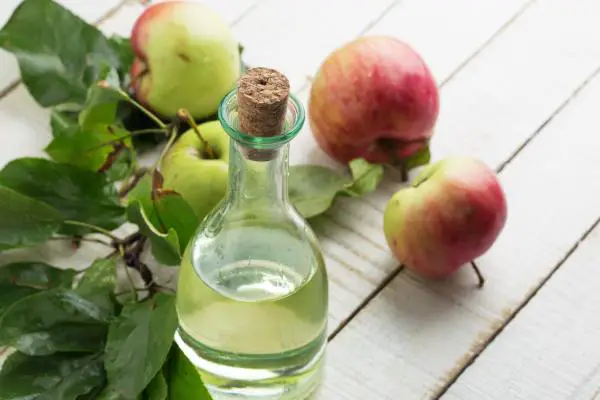This famous seasoning is widely used in everyday life, home cosmetics, and medicine. Unlike regular table vinegar, apple cider vinegar is more flavorful and healthy. It can also come in handy for houseplants and in gardening. What is the best way to use it?
Most often, this type of vinegar is used for medicinal and cosmetic purposes: in the morning they drink water with apple cider vinegar for weight loss and energy, use it to strengthen hair, cleanse the skin with it, etc. It is also good at home for cleaning various surfaces or removing stains. But it will be interesting for gardeners to get acquainted with the ways to use apple cider vinegar in the garden:

How to use apple cider vinegar for indoor plants and Gardening
1. Apple cider vinegar as fertilizer
Many are aware of the use of white vinegar as a herbicide. Apple cider vinegar has the opposite effect, as it has 5% (maximum 6%) acidity. It is used as a fertilizer to maintain healthy plants that prefer acidic soils (azalea, gardenia, blueberry, and others). In addition, it contains many nutrients that are beneficial for plant development.
To do this, you need to dilute about a liter of unfiltered natural apple cider vinegar in 10 liters of water. The concentration of vinegar should not be high, so as not to harm the soil and plants. The solution is gently watered around the roots using a spray bottle or watering can. It is undesirable for the solution to get on the plants themselves.
Check also How To Make Wood Ash Fertilizer?
2. Getting rid of fruit flies
Apple cider vinegar can also be used to protect fruits and fruit trees from fruit flies (fruit flies), as flies cannot stand the smell. To do this, pour half a cup of apple cider vinegar, dissolve 1/4 cup of sugar in it, add molasses (a tablespoon) and a glass of water. Mix everything and pour into empty, clean canned food cans.
Then you need to hang the jars from the branches of fruit trees. This bait can attract fruit flies: they will fly off to the smell and die in the solution. To obtain the effect, you need to hang the jars at the level of fruit development. A trap is also suitable for flies that managed to appear at home.
3. Cleaning garden tools from rust
Rust attacks metal garden tools that are stored in damp conditions. You can use apple cider vinegar to clean up rust. To do this, vinegar is poured into a spray bottle, from which it is sprayed onto rusty metal areas. If there is a high percentage of rust, you can soak the tool in vinegar for a day, and then wipe it off with a dry and clean cloth. But for such purposes, you need to prepare in advance more homemade apple cider vinegar.
See also How Do Plants Use Iodine.
4. Scare away small rodents and animals from the garden
Small animals that live in the garden: raccoons, rabbits, moles, rodents, and even deer can be scared away by the smell of apple cider vinegar. To do this, the fabric is soaked in apple cider vinegar and laid out at different points in the garden. You can get a guaranteed effect from this if you soak the fabric in vinegar at least once a week.
They do not tolerate the smell of vinegar and slugs with snails. To get rid of these pests, you need to make a shaded and damp corner trap using boards or old unnecessary utensils. On a sunny day, snails and slugs will gather in that place, onto which you can gently spray vinegar without harming the plants.
Insect pests that feed on crops can be removed with water-diluted vinegar, which is harmless to the plants. To do this, vinegar is diluted with water in a ratio of 1: 3, a teaspoon of liquid soap is added to the solution, after which it is sprayed onto the affected plants.
5. Cleaning clay pots
Clay pots are used in the garden to keep the soil cool during the hot summer, for the plants to breathe, and just for beauty. From the absorption of calcium and other minerals in the water, the pots lose their attractiveness, discolor. Many people buy new ones, but there is also a more economical solution.
Apple cider vinegar is also great for cleaning ceramics. The pots should be washed to remove dirt and soaked in a solution made from 4 glasses of water and a cup of vinegar. Wait until the surface of the clay container has absorbed the vinegar properly. After that, the pot is rinsed in regular water and becomes like new. Heavily soiled greasy stains can be removed by spraying undiluted vinegar. Then wipe the spray area with a clean cloth.
Read is baking soda good for houseplants?
6. Soil acidification
Some plants grow better in acidic soil, so you can use apple cider vinegar and acidify the soil for their comfort. Just before using vinegar, you need to check the acidity of the soil. If its pH is between 1-6, then the earth is considered acidic. If higher, then it can be acidified with a vinegar solution in the proportion of 4 liters of water per cup of vinegar. To avoid getting too acidic soil, it is necessary to regularly check its acidity.
